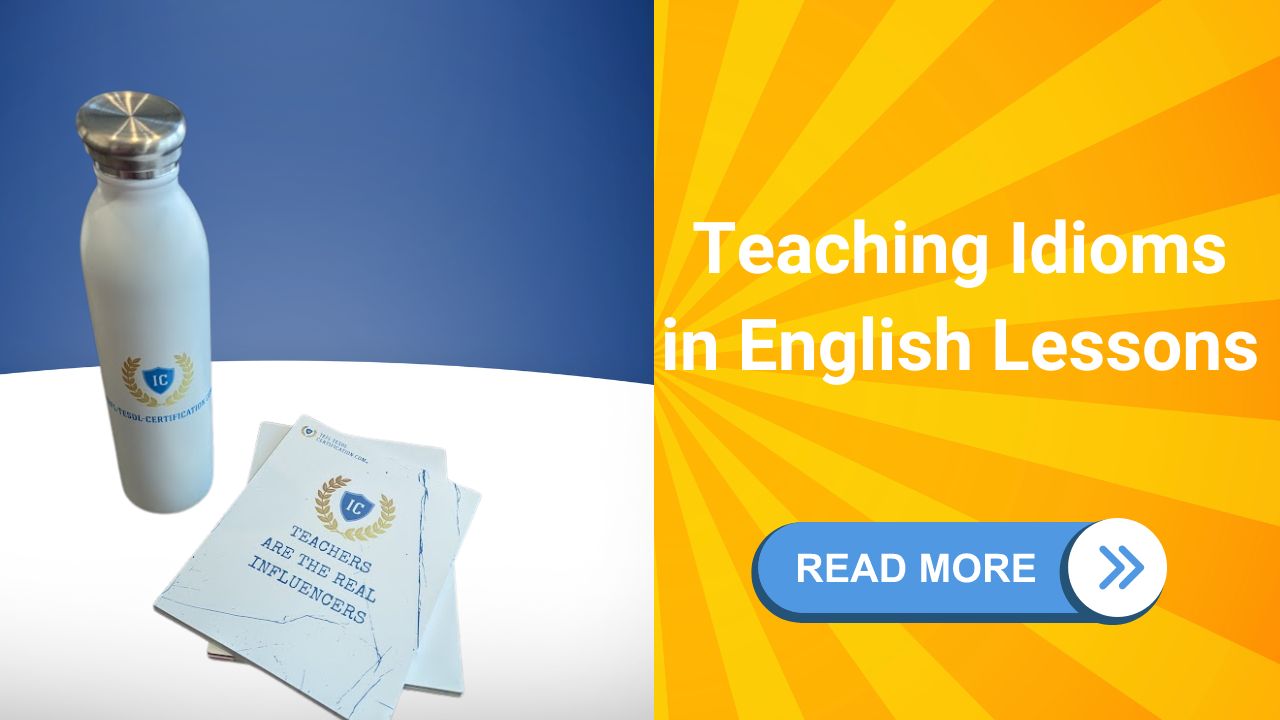And start earning money 💸 by teaching English in your own country, abroad, or online from anywhere on the planet! 🎁 Gifts and bonuses: professional support from your personal coach 🧑🏫 and job placement assistant 💼.
Table of contents
Idioms are an essential component of the English language, adding colour and depth to everyday communication. For English as a Foreign Language (EFL) and English as a Second Language (ESL) learners, understanding idioms can provide a richer, more authentic grasp of the language. It is important for educators to introduce idioms at every level of English Prociency without overwhelming students. By incorporating one or two idioms into each lesson, perhaps as a warm-up activity, students can gradually build their idiomatic knowledge. Utilizing authentic materials such as readings, videos, and audio recordings where idioms are naturally used can also enhance their learning experience.
Teaching Strategies
Warm-Up Activities: Start each lesson with a quick activity focused on idioms. For example, present an idiom and ask students to guess its meaning based on context.
Contextual Learning: Use authentic materials like news articles, short stories, podcasts, or videos where idioms appear naturally. Discuss the idioms in context to help students understand their usage and meaning.
Interactive Activities: Engage students in role-playing, dialogues, or storytelling exercises that incorporate idioms. This makes learning more dynamic and memorable.
Visual Aids: Use images or drawings to illustrate the literal and figurative meanings of idioms. This can help visual learners grasp the concepts more effectively.
Idiomatic Expressions Lists: Gradually build a list of idioms that students can refer to and review regularly.
100 Idioms and Their Meanings
Hit the nail on the head - To be exactly correct about something.
Bite the bullet - To endure a painful or otherwise unpleasant situation.
Burn the midnight oil - To work late into the night.
Kick the bucket - To die.
Spill the beans - To reveal secret information.
Bend over backwards - To go out of one's way to help someone.
Caught red-handed - Caught in the act of doing something wrong.
Hit the sack - To go to bed.
The ball is in your court - It's your decision or responsibility.
Cut corners - To do something in the easiest or cheapest way.
Feel a bit under the weather - To feel slightly ill.
Get a taste of your own medicine - To experience the same bad treatment that you have given to others.
Go the extra mile - To make a special effort.
Hold your horses - Wait a moment.
In the heat of the moment - Overwhelmed by what is happening at the moment.
Jump on the bandwagon - To follow a trend.
Keep something at bay - To keep something away.
Kill two birds with one stone - To accomplish two things with one action.
Let sleeping dogs lie - To avoid restarting a conflict.
On the ball - Alert and attentive.
Play it by ear - To improvise.
Pull someone's leg - To joke or tease someone.
See eye to eye - To agree fully.
Steal someone's thunder - To take credit for someone else's achievements.
Take it with a grain of salt - Not to take something too seriously.
Through thick and thin - Under all circumstances, no matter how difficult.
Throw in the towel - To give up.
A blessing in disguise - Something good that isn't recognized at first.
A dime a dozen - Something common and not valuable.
Add fuel to the fire - To make a bad situation worse.
Bite off more than you can chew - To take on a task that is too big.
Burning the candle at both ends - To overwork yourself mentally or physically.
Cry over spilled milk - To be upset about something that cannot be undone.
Get out of hand - To become uncontrollable.
Hit the road - To leave.
In the nick of time - Just in time.
Make a long story short - To tell something briefly.
Not playing with a full deck - Someone who is mentally unstable.
On the same page - In agreement.
The best of both worlds - The benefits of two different things.
When pigs fly - Something that will never happen.
A penny for your thoughts - Asking someone what they are thinking.
Add insult to injury - To make a bad situation worse.
Barking up the wrong tree - To pursue a misguided course of action.
Beat around the bush - To avoid talking about what’s important.
Better late than never - It's better to do something late than not at all.
Birds of a feather flock together - People who are alike tend to spend time together.
Bite the hand that feeds you - To harm someone who has helped you.
Break a leg - Good luck.
By the skin of your teeth - Just barely.
Can’t judge a book by its cover - Don’t judge something by its appearance.
Caught between a rock and a hard place - Facing two difficult choices.
Clam up - To become silent suddenly.
Come rain or shine - No matter what happens.
Curiosity killed the cat - Being too curious can lead to trouble.
Cut to the chase - Get to the point.
Devil’s advocate - Someone who argues against something for the sake of debate.
Don’t cry wolf - Don’t raise a false alarm.
Don’t put all your eggs in one basket - Don’t risk everything on one venture.
Every cloud has a silver lining - There is something good in every bad situation.
Find your feet - To become comfortable in what you are doing.
Get cold feet - To become nervous.
Give the benefit of the doubt - To believe someone is telling the truth.
Have a change of heart - To change your opinion or feelings.
Hit the books - To study hard.
Ignorance is bliss - Sometimes it’s better not to know.
It takes two to tango - Both parties involved in a situation are responsible for it.
Jump the gun - To act prematurely.
Keep your chin up - Stay positive.
Last straw - The final problem in a series of problems.
Leave no stone unturned - To search thoroughly.
Let off steam - To release pent-up energy or emotion.
Make a mountain out of a molehill - To exaggerate a small problem.
Miss the boat - To miss an opportunity.
Off the hook - No longer in trouble.
On thin ice - In a precarious or risky situation.
Out of the blue - Unexpectedly.
Put a sock in it - To tell someone to be quiet.
Save face - To avoid embarrassment.
Throw caution to the wind - To take a risk.
Wrap your head around something - To understand something complicated.
You can’t have your cake and eat it too - You can’t have everything your way.
A leopard can’t change its spots - One cannot change their inherent nature.
Actions speak louder than words - What someone actually does means more than what they say they will do.
All bark and no bite - Talking tough but not willing to act.
Back to square one - To start something over again.
Bite the dust - To fail or be defeated.
Blow off steam - To express anger or frustration.
Break the bank - To use up all of one’s money.
Burn bridges - To destroy relationships.
Call it a day - To stop working on something.
Cry wolf - To raise a false alarm.
Cut someone some slack - To give someone a break or not judge them too harshly.
Draw the line - To set a limit on what one is willing to do or accept.
Fit as a fiddle - In good health.
Give someone the cold shoulder - To ignore someone deliberately.
Go down in flames - To fail spectacularly.
Jump through hoops - To go through a lot of effort or trouble to achieve something.
Let the chips fall where they may - To let something happen without trying to influence the outcome.
Rain on someone’s parade - To spoil someone’s plans.
💡 Unlock the secrets to doubling your teaching income with our exclusive checklist! 🎯 This checklist is designed for English teachers who want to 📈 attract more students and 🔥 keep them engaged for the long term.
When teaching idioms in English lessons, it’s essential to provide learners with not only definitions but also meaningful contexts that help idiomatic expressions come alive. A highly useful resource for this purpose is 131 Illustrated Business Idioms: Speak Like a Pro at Work—Illustrated Idioms Explained with Real-Life Business Context. This book presents business idioms through real-world situations and illustrative examples, making otherwise abstract expressions easier to understand and remember. Whether you’re teaching business English or general idiomatic usage, incorporating visual and contextualized explanations like those in this book can deepen students’ comprehension, boost confidence, and encourage natural use of idioms in both spoken and written communication. It’s an excellent support for lessons where meaning, cultural nuance, and practical usage all matter.
Conclusion. TEFL & TESOL Certification
Incorporating idioms into English lessons can significantly enhance students' language skills by providing them with a more authentic and nuanced understanding of English. As EFL/ESL teachers, it is crucial to be well-equipped with such knowledge and teaching strategies. Additionally, obtaining a TEFL/TESOL certificate is fundamental for professional development and ensures that educators possess the necessary skills and knowledge to teach English effectively. By integrating idioms into your lessons, you not only enrich your students' vocabulary but also help them appreciate the cultural richness of the language.
Terms used:
EFL, ESL, TEFL, TESOL

York Fern
An English instructor with 12+ years of experience. I work for an online school and travel the world, teaching students from various countries, leveraging my TEFL/TESOL certification. Seeing the world's oceans, mountains, and cities with my own eyes has given me a profound appreciation for the importance of quality education and international communication.
and start earning by teaching English in your country, abroad, or online from anywhere in the world! Order the course with a 50% discount 💸 and receive as a gift the support of a personal coach 👨🏫 and job placement assistant! 🎁🚀 Hurry, limited spots available! 🏃♂️💨
💡 Unlock the secrets to doubling your teaching income with our exclusive checklist! 🎯 This checklist is designed for English teachers who want to 📈 attract more students and 🔥 keep them engaged for the long term.
🚀 More students, 💰 higher income, 🌍 complete freedom! ✅ 112 verified platforms with top rates ⏳ Flexible schedule – work whenever and as much as you want 🎯 Simple requirements – start earning right away 💎 Boost your career and income by teaching students worldwide!
choose us?




